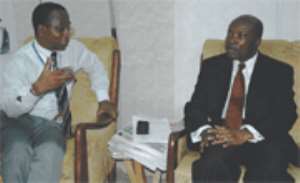
The Chief Executive Officer of the National Health Insurance Council (NHIC), Mr Ras Boateng, has stated that despite the teething problems faced by the National Health Insurance Scheme (NHIS), it remains the best way of financing the country's health needs.
He said contrary to views that the scheme was failing, results on the ground pointed to a success story.
For example, in just two years of implementing the rather complex and novelty project, the scheme had been able to reach 7.7 million or 38 per cent of the population, he said, adding that the 50 per cent mark would soon be crossed.
Mr Boateng said this yesterday when he paid a courtesy call on the Editor of the Daily Graphic, Mr Yaw Boadu-Ayeboafoh.
His visit was also to discuss ways of collaborating with the country's most widely circulated and read newspaper to educate the public on the NHIS, since the NHIC boss was worried about the frequent negative press to which the scheme was subjected.
He underlined the fact that the NHIC had designed a number of corporate structures to ensure uniformity in the operations of the scheme in every district.
“These include a new uniform card for all health insurance subscribers nation-wide to ensure that card holders can move from one area to another with ease."
Mr Boateng said the council was also introducing a new concept of having a central office in the local areas, replete with men and equipment, where claims would be adjudicated and processed speedily, explaining that the speedy processing and payment of claims was necessary to unburden service providers and spur the scheme on to success.
He advised service providers to avoid the temptation of prescribing drugs outside the approved drug list.
The NHIC boss said in collaboration with the country's development partners, the council was currently working on a project to interface providers and insurers to ensure the timely filing of claims.
In addition, he said, operational manuals were being developed for all stakeholders to ensure that the system became foolproof.
Mr Boateng said the council had also engaged national service persons at the secretariat to quicken the pace of work so that the needs of service providers could be tackled expeditiously.
He charged all Ghanaians and stakeholders to put their shoulders to the wheel to ensure that the scheme succeeded
and urged the public to report all forms of malpractice and maltreatment to the appropriate quarters for action, adding that the mistake was often made in leaving all blame at the doorstep of the council.
“All district health insurance schemes are companies limited by guarantee, with boards of directors, and must take responsibility for all wrongs within their area,” he said.
Mr Boateng explained that the council was only a regulator of the sector and was not engaged in the day-to-day operations of unit health insurance schemes.
Mr Boadu-Ayeboafoh encouraged the council to do more to solve the issue of mobility, since it would encourage subscribers to sign on to the scheme.
He said since illness was not predictable, it would be a big boost for subscribers to know that they could access the service from any provider, irrespective of their geographical location in the country.
“We think the scheme is a positive move and if it is effectively implemented, it can transform the country,” he said.
The Editor gave the assurance that the Daily Graphic would do its best to ensure that the public was sufficiently educated on the scheme so that they could reap its full benefits.
At the same time, Mr Boadu-Ayeboafoh said, the paper would equally bring to public notice the lapses in the scheme for redress.
“Our primary interest is the beneficiaries of the scheme and we will pursue that cause,” he stressed.
Story by Samuel Doe Ablordeppey




 Akufo-Addo’s govt is the ‘biggest political scam’ in Ghana’s history – Mahama ja...
Akufo-Addo’s govt is the ‘biggest political scam’ in Ghana’s history – Mahama ja...
 Performance Tracker is not evidence-based — Mahama
Performance Tracker is not evidence-based — Mahama
 Four arrested for allegedly stealing EC laptops caged
Four arrested for allegedly stealing EC laptops caged
 $360 million IMF bailout not enough for Ghana – UGBS Professor
$360 million IMF bailout not enough for Ghana – UGBS Professor
 Shrinking Penis Allegations: Victim referred to trauma hospital due to severity ...
Shrinking Penis Allegations: Victim referred to trauma hospital due to severity ...
 Adu Boahen Murder: Case adjourned to May 9
Adu Boahen Murder: Case adjourned to May 9
 ‘I've health issues so I want to leave quietly and endure my pain’ — Joe Wise ex...
‘I've health issues so I want to leave quietly and endure my pain’ — Joe Wise ex...
 Let’s help seek second independence for Ghana before NPP sells the country – Law...
Let’s help seek second independence for Ghana before NPP sells the country – Law...
 New Force aims to redeem Ghana and West Africa — Nana Kwame Bediako
New Force aims to redeem Ghana and West Africa — Nana Kwame Bediako
 ‘I didn't say I would buy Ghana if voted against; I said I’ll buy it back from f...
‘I didn't say I would buy Ghana if voted against; I said I’ll buy it back from f...
